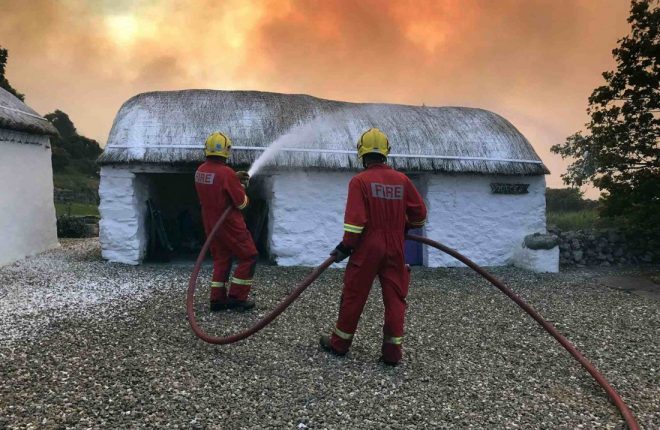
Firefighters spray foam on to the roofs of thatched cottages to protect them from a nearby wild fire. Photo: Buncrana Fire and Rescue Service.
HUMAN hands have been blamed for igniting an overwhelming majority of the wildfires that swept rural parts of Donegal recently.
Firefighters experienced their busiest spell in years as blazes broke out in dozens of locations, most significantly in Inishowen.
Last Sunday alone, 18 blazes were reported to Fire Service personnel. Those were flanked by 13 calls on Saturday, ten on Monday and a further eight on Tuesday.
Donegal’s Chief Fire Officer, Joe McTaggert, said it had been an “extremely demanding” few days for his team.
The worst of the fires occurred on the Urris Hills in Inishowen. There a blaze broke out on Sunday and continued to burn for three days. At its height, plumes of smoke from the Urris fire could be seen as far away as Letterkenny.
Further blazes were dealt with on Fahan Hill and at Glennevin Waterfall in Clonmany.
As the flames raged, fire crews at one stage were forced to take measures to protect a number of thatched cottages.
Joe McTaggert told the Donegal News that as well as Inishowen’s three brigades, firefighters had to be drafted in from Letterkenny, Stranorlar, Ballyshannon and Killybegs.
“It put a massive demand on the resources of the Fire Service,” said Donegal’s Fire Chief.
“And what we have to consider is that when resources are tied up in incidents like this, they are not immediately available in other instances where life maybe at risk, whether that is on the roads, in a house fire, and there are possible implications there for those involved.”
Mr McTaggert said the Fire Service was not an investigative authority and that their role was purely to protect property. He did say however that he believed human hands had played a role in many of the blazes.
“In my opinion, the overwhelming majority would have had human interaction of some degree, whether that is a lit cigarette, a lit match, failing to properly extinguish hot ashes or someone starting a fire deliberately.
“And again, when our brigades are responding to those, they are not available for other life critical or property critical situations and I believe it is a matter of not if, but when, that someone will suffer injury or even loss of life as a result.”
While the full scale of the damage caused has yet to emerge, the financial cost to the public purse is expected to run to tens of thousands and possibly hundreds of thousands of euros.
“The financial cost is not something we ever consider and our job is to respond when asked to,” Mr McTaggert added.
“But I would expect there will be a financial cost and that it will be relatively large. That will be taxpayers’ money and if that money is being use to fight fires, then it is not available for other issues which will then have a direct impact on the citizens of Donegal.”









